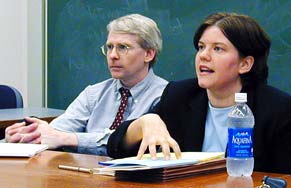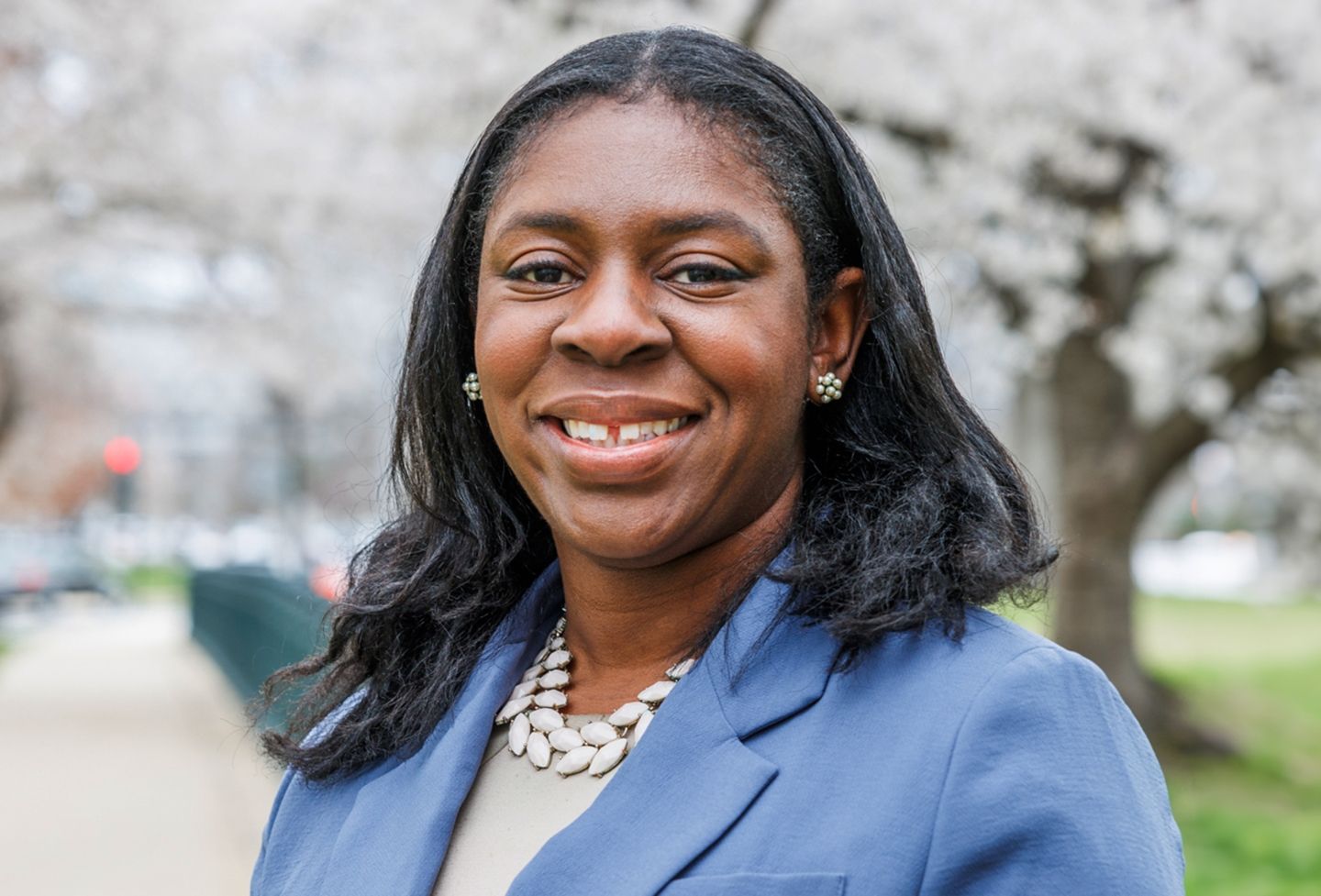Supreme Court Could Overturn Law Targeting Same-Sex Sodomy

While they appear increasingly outdated, sodomy laws still exist in 14 states, Puerto Rico and the military, and while many such laws target gays in practice, four states target homosexuals explicitly. Scheduled to be heard March 26, Lawrence v. Texas challenges the Lone Star state's "Homosexual Conduct" Law, a statute instituted by Texas in 1973 that outlaws consensual oral or anal sex between same-sex partners. Backed by Lambda Legal and Jenner & Block, this particular case — representing issues of sexuality, privacy and discrimination — seemed ripe for use as a testing ground for gay rights, according to Jenner & Block attorney Sharon McGowan, a co-counsel for the petitioners who helped write the brief. McGowan and law professor John Harrison discussed the case at the Law School March 18 during a panel sponsored by Lambda Law Alliance.
"This case is going to have ripple effects not only in sexual orientation law but other areas of law," McGowan said. Other laws targeting gays — such as Florida's ban on adoptions by gays — are or will soon be challenged in courts, and this case could show the early tilt of that movement.
Texas repealed a number of its laws pertaining to sexual conduct in 1973 in a massive penal code overhaul, including laws against bestiality, sodomy, adultery and fornication. But the state maintained a law against same-sex sodomy. It landed John Lawrence and his partner, Tyron Garner, in jail in 1998 after a neighbor reported an armed burglary and police found Lawrence and Garner having consensual sex in Lawrence's Houston apartment. The neighbor was later convicted of filing a false report.
The case "presents such a stark case of government intrusion," McGowan said, that her firm felt compelled to join Lambda Legal in resolving the case. "Our argument is, you cannot make an act illegal based on who's doing it."
In her introduction to the panel, law professor Anne Coughlin explained that she had clerked for Justice Lewis Powell during the year the Supreme Court handed down its Bowers v. Hardwick decision in 1986, ruling in favor of Georgia's law banning consensual sodomy regardless of sexual orientation, although the law in practice targeted gays.
"My own opinion is that the Court made a mistake," she said. "I hope that the mistake will be corrected."
Coughlin said she did not work on the case, and wished she had tried to do more to affect the outcome. Two years after the decision, in a speech at New York University, Powell said his decision was wrong.
Lawrence made its way to the Supreme Court slowly. In June 2000 an appellate court overturned the convictions, saying the Homosexual Conduct Law was unconstitutional. The Texas Court of Appeals upheld the law and reinstated the conviction. When a discretionary appeal was denied in the Texas Court of Criminal Appeals, Jenner & Block decided to get involved. McGowan said there was some discussion in her firm as to whether now was the right time to go before a notably conservative Supreme Court, but because the men had criminal records as a result of the convictions, they felt it was a "compelling avenue to bring Bowers to court."
In their brief, McGowan said they presented three questions based on due process, whether Bowers should be overruled, and equal protection. The Lawrence team grew more optimistic when the Court asked for Texas's oppositionus cert, a sign they would take the case.
"All three questions were accepted by the Court for consideration," she said.
In its equal protection argument, McGowan said the brief questioned whether it was appropriate to make acts illegal for certain groups. The due process argument revolved around the right of intimate association, "the privacy interests that are protected in the home," and the interest in bodily integrity established in cases like Roe v. Wade. All these strands "inform privacy rights we ask the Court to address."
McGowan called the Bowers decision a "fundamental misunderstanding of the case" because the Court framed it as a same-sex issue, rather than a right of all people, and divorced the right from the idea of family. In their brief, she said, they argue that sexual relationships among same-sex participants are also important to building families. She expressed optimism that changing mores would inform their views differently this time. A recent article in the Washington Post noted the Chief Justice William Rehnquist had a friendship with gay neighbors beginning in 1986.
Texas' justification of the law has been weak, she said.
"Throughout, the state of Texas has not been able to make any other argument than public morality," McGowan said, noting that efforts to label certain acts as wrong for some and not others "should be looked at with tremendous skepticism by the Court."
Law professor John Harrison, joking that he thought the First Amendment should have stopped with "Congress shall make no law," said the case made him feel torn between his "libertarian crank" side and his "boorish" obsession with constitutional structure and legislative minutiae. His libertarian colleagues at the Cato Institute have filed a brief in support of Lawrence's case, arguing the law was unconstitutional, but Harrison disagreed.
"There's not a solid textual basis in the Constitution for the claim that this is unconstitutional," he said.
Harrison cited the Court's decision in Romer v. Evans, which struck down Colorado's Amendment 2 in 1996 based on the 14th Amendment's equal protection clause. Amendment 2 was a statewide initiative narrowly passed by voters that prohibited all branches of state government in Colorado from passing legislation or adopting policies prohibiting discrimination against lesbians and gay men based on their sexual orientation. Harrison noted that, despite Romer, only a small number of cases are struck down based on a "bare desire to harm" because the Court is reluctant to try to determine motives behind laws. Harrison said if you start saying laws based on morality or who wins or loses are unconstitutional, then many laws would be found unconstitutional.
Stipulating that "there isn't a right to privacy" in the federal Constitution, Harrison suggested the Court may struggle with establishing a coherent theory of the right of privacy, given its non-textual origins.
Coughlin concurred with Harrison's reading of the Court, adding, "One of Powell's concerns [in Bowers] at the time was there needed to be some core" to the right of privacy, and this fell way outside of that core.
Harrison argued that all constitutional questions revolve around the structural question of who has decision-making authority, and whether the judiciary should be making policy decisions, as he said they undeniably now do. The typical opposing argument — the Supreme Court is necessary because fundamental rights shouldn't be left to a majority vote — is incorrect, since the Supreme Court decides by majority as well.
"The question is, how good are the courts as a representative or political institution?" — lousy, he alleged, since they are several steps away from the electorate in how they are chosen and appointed.
McGowan responded that regardless of whether there is a political component to the Court, they are asking the Court to "act as a referee to make the rules fair." She said it was wrong to target a law only at gays. "That is cognizable and the Supreme Court has the right to ask why."
Founded in 1819, the University of Virginia School of Law is the second-oldest continuously operating law school in the nation. Consistently ranked among the top law schools, Virginia is a world-renowned training ground for distinguished lawyers and public servants, instilling in them a commitment to leadership, integrity and community service.


